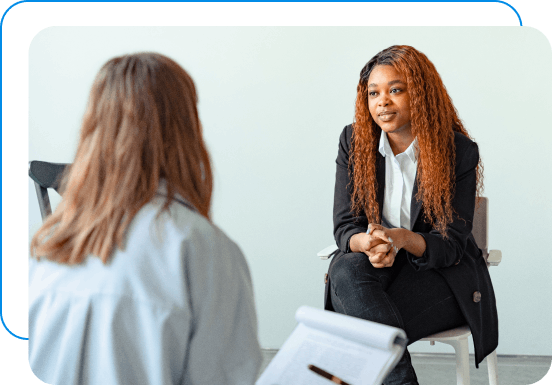Counselling services
Eating Disorder Therapist
Eating disorders can seriously affect your mental and physical health. Luckily, they can be treated with support from a registered eating disorder psychologist.
Reach out to us to book a session today.


What is Eating Disorders Counselling?
Eating disorder treatment is a form of talk therapy that helps those with disordered eating issues become mentally and physically healthy again.
Typically, those struggling with an eating disorder have underlying issues that need to be treated before creating a healthy relationship with food. A registered psychologist will work with you or your loved one through solution-focused therapy to determine what may contribute to your unhealthy eating patterns. They will work with you to develop healthy coping skills and strategies to overcome your eating disorder.
Types of Eating Disorders
Anorexia Nervosa
Anorexia is an eating disorder that can occur when a person is not eating enough food. This is often an obsession or lifestyle in which individuals prioritize extreme calorie counting, exercise, and weight loss resulting in significantly low body weight.
Bulimia Nervosa
Bulimia nervosa is an eating disorder in which a person has a false view of their body image and faces unhealthy addictions regarding weight loss. The disorder is similar to anorexia, but those with bulimia may find themselves binge eating and immediately forcing themselves to purge, fast, or vomit.
Binge Eating Disorder
Common Eating Disorder Symptoms & Signs
- Emotional eating
- Significantly low body weight
- Depression or anxiety disorders
- Self-induced vomiting after eating
- Significant weight loss
- Low self-esteem and body image concerns
- Frequent dieting
- Constant feelings of weakness, fatigue, and nausea
- Refusing to eat certain foods in fear of gaining weight
- Extreme mood swings

Why You Should Seek Help For An Eating Disorder
When you fixate all your energy on food, you could end up harming yourself more than you may realize.
When you seek treatment for eating disorders, you will understand there are healthier approaches to becoming the best version of yourself. If you’re struggling with an internal battle that you don’t feel you can beat, know that where there is a will, there’s a way. Seeking help for your eating disorder will help guide you in the right direction and improve your daily life.



Our Approach to Eating Disorders Counselling
At Can’t We Just Get Along Counselling, our eating therapists will work with you from the moment you walk in the door until you have developed a healthy relationship with food.
We know that getting help for your eating disorder is not an easy task. That’s why we always offer caring and compassionate guidance to help you deal with your situation. We will work with you to determine where your eating habits stem from while helping you learn coping strategies so you can heal.
Don’t deal with your eating disorder in silence; reach out for support. Eating disorder counselling can open up the discussion around other mental health concerns you may have. If that occurs, we have additional support, like anxiety counselling, that we can use to work through your pain and help you.



Get the Help You Need to Overcome Your Eating Disorder
If you feel that you or your loved one is suffering from an eating problem, reach out and get the help you deserve. We’re proud of you for acknowledging your feelings and taking the extra step to establish healthy eating habits.
Book an eating disorder counselling appointment in Calgary today.

Frequently Asked Questions
Depending on the type of eating disorder and its severity, your doctor may know you have an eating disorder. If you have a rapid change in your physical appearance due to weight loss or weight gain, your doctor may discuss your eating patterns and refer you to a therapist if they have any concerns.
The best way to discuss unhealthy eating habits is to focus on mental health, as eating disorders typically stem from much larger mental health issues related to anxiety or depression. Try to guide them to get support from a registered therapist who has experience helping those suffering from eating disorders. When discussing unhealthy eating on a day-to-day basis, support your loved ones, promote positive self-esteem, and listen to their feelings.

